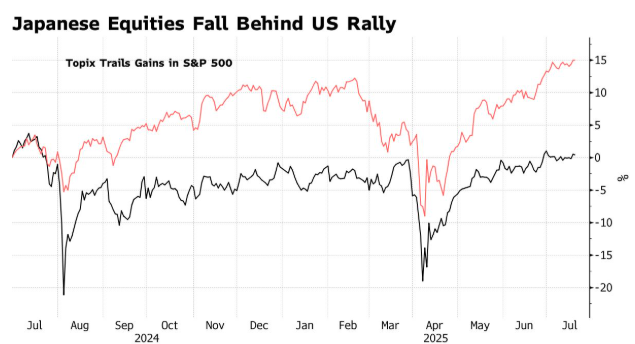After Japanese Prime Minister Shigeru Ishiba suffered a historic defeat in the election, Japanese government bonds are likely to be further sold off, although the direct reaction on Tuesday was curbed by a rebound in global debt markets.
Japanese 10-year and 20-year government bonds edged lower in Tokyo trading after the resumption, with yields rising by 0.5 and 1.5 basis points respectively. The stock market rose slightly, buoyed by post-election relief measures, although its outlook remains clouded by tariffs. The yen weakened and faces downside risks in the coming days and weeks from government spending increases.
Although Ishiba Shigeru’s temporary retention of the prime minister’s post can bring a certain degree of continuity to the market, he also needs to find ways to placate opposition lawmakers seeking tax cuts and families hoping for relief from inflation. Any concessions to these pressures are expected to quickly translate into rising bond yields.
As the Japanese stock market was closed on Monday due to a national holiday, investors’ initial views on the election were mainly expressed through the yen. The yen rose by about 1% against the US dollar after weakening for most of July. As of 11:40 a.m. Tokyo time, the yen was down about 0.1% against the US dollar at around 147.51.
Katsutoshi Inadomi, senior strategist at Sumitomo Mitsui Trust Asset Management, said: “Market concerns over fiscal expansion are heating up. Given the election results, Japanese government bonds may face selling pressure. I expect the yield curve to steepen in a bearish manner, especially driven by ultra-long-term bonds.”

Yields on 20- to 40-year Japanese government bonds edged down slightly on Friday, but have been rising sharply in recent months. The volatility in Japanese bond yields has spread to global markets, reflecting investors’ concerns that the Japanese government is spending beyond its means.
Any calm in Japan’s government bond market is unlikely to last. The Japanese government needs to continue with expansionary policies to win the support of smaller parties. Moreover, a 40-year bond auction is scheduled for Wednesday, which is unlikely to go smoothly… Meanwhile, the global theme of a steepening yield curve has not dissipated.
Lack of transparency in fiscal and economic policies may weaken the global appeal of Japanese assets, at least in the short term. She added that political uncertainty could complicate trade negotiations between Tokyo and Washington, thereby dampening market sentiment.
Finance Minister Katsunobu Kato said Tuesday that the opposition’s proposal to cut the consumption tax is not appropriate.
Although Japan’s benchmark Topix stock index has rebounded from a sharp fall after US President Donald Trump launched his tariff offensive in April, it is still far below the record high it reached in the middle of last year.

Hiroshi Nakanishi, chief strategist and fund manager at T&D Asset Management, said the yen could also come under pressure on Tuesday, especially if long-term government bonds are sold off. “There is a high possibility of the yen depreciating,” he said. “Although I expect the yield on ultra-long Japanese government bonds to rise, it is due to negative factors. This could trigger a sell-off of the yen.”


